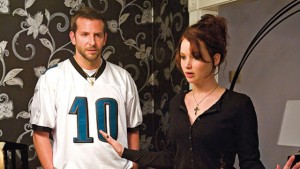 David O. Russell’s Oscar-winning film The Fighter mined a great deal of humor from the off-beat clan dynamic and expressive shouting matches between a Boston family- it was clear these people had no other tools for communicating with each other beyond screaming and interrupting. That element of the film lived alongside the underdog narrative and brotherly struggle, and yet the movie was never more engaging than when it reached those cacophonous crescendos of Southies screaming at each other. With Silver Linings Playbook, O. Russell dives full on in to that same backdrop of familial friction, though tuning this adaption of Matthew Quick’s novel to the key of an outright comedy with some substantive dramatic elements providing a beating heart. Like many films of the sort, the exaggeratedly attractive leads require you to divide this whole thing by some Hollywood gloss to make it truly relatable, but if you do, it is.
David O. Russell’s Oscar-winning film The Fighter mined a great deal of humor from the off-beat clan dynamic and expressive shouting matches between a Boston family- it was clear these people had no other tools for communicating with each other beyond screaming and interrupting. That element of the film lived alongside the underdog narrative and brotherly struggle, and yet the movie was never more engaging than when it reached those cacophonous crescendos of Southies screaming at each other. With Silver Linings Playbook, O. Russell dives full on in to that same backdrop of familial friction, though tuning this adaption of Matthew Quick’s novel to the key of an outright comedy with some substantive dramatic elements providing a beating heart. Like many films of the sort, the exaggeratedly attractive leads require you to divide this whole thing by some Hollywood gloss to make it truly relatable, but if you do, it is.
Silver Linings Playbook is, if nothing else, a showcase in chemistry and exceptional charisma on the part of its two leads, Bradley Cooper and Jennifer Lawrence. The former stars as Pat, who struggles with a laundry list of anxiety and anger issues that, once met with the betrayal of his wife, pushed him over the edge, with the movie beginning eight months later as he emerges from a court-mandated stay in a mental healthy facility following a never-explicitly-described “incident.”
Cooper is instantly electrifying as Pat who exudes an off-putting charisma that is a blast to watch, but is clearly impossible to deal with if you’re actually in his life. His big blue eyes, brutally honest wit, and general sense of perfect timing are surely sexier than the personalities of most emotionally off-kilter people you’re likely to meet, but Cooper still conveys a believable anxiety that resonates despite how utterly entertaining he is to watch.
 Soon Pat meets Tiffany, at which point Jennifer Lawrence enters the film looking more beautiful than ever, and yet presenting the most convincing emotional trainwreck in the film. A woman who has responded to a huge tragedy by trawling for sex to replace social connection, the film and Lawrence’s performance deftly convey the characters weaknesses without every actually exploiting her for audience titillation. It’s a great trick, and a real feather in the film’s cap. Without cheap sensationalism, Lawrence is free to craft a remarkable performance as the magnetic yet genuinely caustic Tiffany, who soon begins pulling the best out of Pat when they agree to help each other out. Once Cooper and Lawrence begin sharing the screen, the film really takes off as scenes with the two visibly pop and crackle with energy. These two only get crazier when they around each other, and yet even then they’re pulling the best crazy out of each other.
Soon Pat meets Tiffany, at which point Jennifer Lawrence enters the film looking more beautiful than ever, and yet presenting the most convincing emotional trainwreck in the film. A woman who has responded to a huge tragedy by trawling for sex to replace social connection, the film and Lawrence’s performance deftly convey the characters weaknesses without every actually exploiting her for audience titillation. It’s a great trick, and a real feather in the film’s cap. Without cheap sensationalism, Lawrence is free to craft a remarkable performance as the magnetic yet genuinely caustic Tiffany, who soon begins pulling the best out of Pat when they agree to help each other out. Once Cooper and Lawrence begin sharing the screen, the film really takes off as scenes with the two visibly pop and crackle with energy. These two only get crazier when they around each other, and yet even then they’re pulling the best crazy out of each other.
The script employs fairly traditional romantic conventions to entangle them in each other’s lives, but between the great performances, some sharp screenwriting, and O. Russel’s filmmaking it reads as much more realistic than a trailer or logline would promise. O. Russell also makes the strong call to thoroughly establish Pat’s family dynamic before getting into the love story, and it’s here that his handle on capturing the rhythm of dysfunction shines. Through Pat’s mother and father, we witness the self-evident sources of Pat’s neuroses and get a sense of their history by how they re-adjust to living with each other again.
 Cooper’s work here with Robert DeNiro and Jacki Weaver is great stuff, with DeNiro especially letting himself loose in a way that’s doubly pleasant just for how it lets us all know he still has it in him. The film doesn’t shy away from the fact that even though Pat had an incident that put the spotlight on him, his father is just as crazy and handed down issues to his son like some fathers hand down dress shoes. Also, though we know Pat and his father probably share DNA that predisposes them for OCD, bi-polar disorder, etc., through DeNiro’s electrified performance we also see that the pattern for expressing oneself through one’s neuroses has been thoroughly modeled by the man of this house. Weaver too endears herself as a sweet coddler who has only the best hopes for everyone, even if her actions are the agency of enablement.
Cooper’s work here with Robert DeNiro and Jacki Weaver is great stuff, with DeNiro especially letting himself loose in a way that’s doubly pleasant just for how it lets us all know he still has it in him. The film doesn’t shy away from the fact that even though Pat had an incident that put the spotlight on him, his father is just as crazy and handed down issues to his son like some fathers hand down dress shoes. Also, though we know Pat and his father probably share DNA that predisposes them for OCD, bi-polar disorder, etc., through DeNiro’s electrified performance we also see that the pattern for expressing oneself through one’s neuroses has been thoroughly modeled by the man of this house. Weaver too endears herself as a sweet coddler who has only the best hopes for everyone, even if her actions are the agency of enablement.
Driving deeper into a loose, handheld style, O. Russell shoots most of the movie in hovering long-lens shots with extremely basic set ups, naturalistic blocking and spare production design. That said, though the film is sloppily captured it is always precisely aimed- like the filmmaking of the Duplass Brothers, except all grown up and actually useful. Occasionally he’ll toss in a dramatic push-in across a room or an elaborate tracking shot, while his typically deft use of montage and needle drops ensure the film isn’t devoid of all style or flair
To be sure, some overly cute coincidences such as the archetypical Indian therapist turning out to be a face-painting Eagles fan who ends up caught in this family’s wake, or the string of coincidences that tie the emotional climax into a measurable contest, or having one character running after another to profess love feel a little minor-league for such a confident film. The tertiary characters played by folks like Chris Tucker, John Ortiz, Shea Wigham, and the aforementioned Anupam Kher are also forced to go a little frustratingly broad, but it’s really just so their brief appearances can match energy with the more fully realized and yet consistently hilarious key players. Ultimately the film earns the happinesses and coincidences wrapped up in the climax, and by the time the credits roll it has coasted past any hiccups of triteness with tons of goodwill to spare.
 If Silver Linings Playbook feels small, it’s because it’s a more personal, distilled story from David O. Russell, who tells the vast majority of the story in a handful of living rooms and suburban streets. If the scale is smaller than, say, The Fighter, everything is more potent too- it’s funnier when it’s funny and more dramatic when there’s drama. With barely a scene going by without a huge laugh completely earned by a well-delivered line, perfectly built ensemble argument, or general character absurdity, this meaty look at a family’s generational dysfunction is also wickedly entertaining. O. Russell and his cast prove that drama and comedy can happen simultaneously –not just in proximity to each other — and as a result Silver Linings Playbook is one of the most hilarious AND most touching films of the year.
If Silver Linings Playbook feels small, it’s because it’s a more personal, distilled story from David O. Russell, who tells the vast majority of the story in a handful of living rooms and suburban streets. If the scale is smaller than, say, The Fighter, everything is more potent too- it’s funnier when it’s funny and more dramatic when there’s drama. With barely a scene going by without a huge laugh completely earned by a well-delivered line, perfectly built ensemble argument, or general character absurdity, this meaty look at a family’s generational dysfunction is also wickedly entertaining. O. Russell and his cast prove that drama and comedy can happen simultaneously –not just in proximity to each other — and as a result Silver Linings Playbook is one of the most hilarious AND most touching films of the year.
Rating: 




Out of a Possible 5 Stars